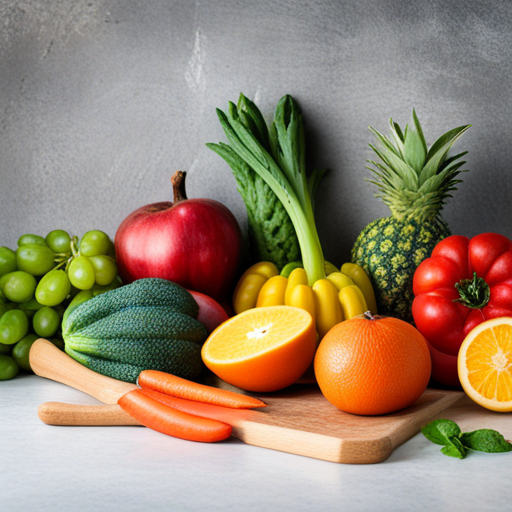
Did you know that a healthy gut plays a crucial role in your child’s overall well-being? From supporting digestion to strengthening the immune system, maintaining a balanced gut is essential. In this blog post, we will explore the best foods for improving gut health in kids. Whether your little one is dealing with digestive issues or you simply want to ensure their gut is in optimal condition, these top 10 gut-healthy foods will provide the necessary nutrients to boost their digestive health.
Understanding Gut Health in Kids
Before diving into the best foods for gut health, let’s take a moment to understand what gut health means. The gut, also known as the gastrointestinal tract, is the long tube that starts from the mouth and ends at the anus. It plays a vital role in the digestion and absorption of nutrients.
When the gut is in good health, it contains a diverse community of microorganisms, including bacteria, viruses, and fungi, known as the gut microbiota. These microorganisms help in the breakdown of food, production of essential vitamins, and support the immune system. However, an imbalance in the gut microbiota can lead to various digestive issues and impact overall health.
The Importance of Gut Health in Kids
Gut health is particularly important for children as it can affect their growth, development, and overall well-being. A healthy gut not only aids in digestion but also influences mood, behavior, and cognitive function.
Research has shown that a healthy gut can contribute to:
- Improved digestion and nutrient absorption
- Enhanced immune function
- Reduced risk of allergies and autoimmune diseases
- Regulated mood and behavior
- Optimized brain development
Now that we understand the significance of gut health in kids, let’s explore the top 10 gut-healthy foods that can help support and improve their digestive system.
Top 10 Gut-Healthy Foods for Kids
When it comes to promoting gut health in kids, incorporating a variety of nutrient-rich foods into their diet is key. Here are the top 10 gut-healthy foods that you can easily include in your child’s meals:
1. Yogurt
Yogurt is packed with probiotics, which are beneficial live bacteria that promote a healthy balance of gut bacteria. Look for yogurt labeled as “live and active cultures” to ensure it contains probiotics. Choose plain yogurt and add fresh fruits or a drizzle of honey for natural sweetness.
Probiotic Strains found in Yogurt:
- Lactobacillus acidophilus
- Bifidobacterium lactis
- Streptococcus thermophilus
2. Fermented Vegetables
Fermented vegetables like sauerkraut and kimchi are rich in probiotics and contain high levels of vitamins and minerals. These tangy and tasty additions to meals can help support a healthy gut. Start by adding small amounts to your child’s plate and gradually increase the portion size.
Probiotic Strains found in Fermented Vegetables:
- Lactobacillus plantarum
- Lactobacillus brevis
- Leuconostoc mesenteroides
3. Whole Grains
Whole grains like oats, brown rice, and whole wheat bread are excellent sources of fiber. Fiber acts as a prebiotic, providing nourishment for the beneficial bacteria in the gut. Incorporate these whole grains into your child’s meals to support a healthy digestive system.
Examples of Whole Grains:
- Oats
- Brown rice
- Whole wheat bread
4. Beans and Legumes
Beans and legumes, such as lentils and chickpeas, are rich in fiber and protein. They also contain resistant starch, which acts as a prebiotic and promotes the growth of beneficial gut bacteria. Include beans and legumes in your child’s diet to support a healthy gut.
Examples of Beans and Legumes:
- Lentils
- Chickpeas
- Kidney beans
5. Fruits and Vegetables
Fruits and vegetables are not only rich in vitamins and minerals but also provide essential fiber to support a healthy gut. Encourage your child to eat a variety of colorful fruits and vegetables to ensure they receive a wide range of nutrients and fiber.
Examples of Gut-Healthy Fruits and Vegetables:
- Apples
- Berries
- Spinach
- Broccoli
- Carrots
6. Probiotic Supplements
In addition to naturally occurring probiotics in food, you can also consider probiotic supplements for your child. These supplements provide a concentrated dose of beneficial bacteria, helping to maintain a healthy gut flora. However, it’s important to consult with your child’s pediatrician before introducing any supplements.
7. Bone Broth
Bone broth is rich in collagen, amino acids, and minerals that support gut health. It can help soothe and repair the gut lining, reducing inflammation and promoting better digestion. You can make homemade bone broth using chicken or beef bones and enjoy it as a warm and nourishing drink or use it as a base for soups and stews.
8. Prebiotic Foods
Prebiotics are non-digestible fibers that act as food for the beneficial bacteria in the gut. Including prebiotic-rich foods in your child’s diet can help support the growth of these beneficial bacteria. Some examples of prebiotic foods include bananas, onions, garlic, and asparagus.
Examples of Prebiotic Foods:
- Bananas
- Onions
- Garlic
- Asparagus
Conclusion
Incorporating these top 10 gut-healthy foods into your child’s diet can have a positive impact on their digestive health. Yogurt, fermented vegetables, whole grains, beans and legumes, fruits and vegetables, probiotic supplements, bone broth, and prebiotic foods all provide essential nutrients, probiotics, and fiber that support a healthy gut flora.
Remember to introduce these foods gradually and encourage your child to eat a diverse range of nutrient-rich options. Additionally, consult with your child’s pediatrician before making any significant changes to their diet or introducing supplements.
By prioritizing gut health, you can help your child maintain a strong immune system, improved digestion, and overall well-being. Start incorporating these gut-healthy foods into your child’s meals today and set them on a path to lifelong digestive health.